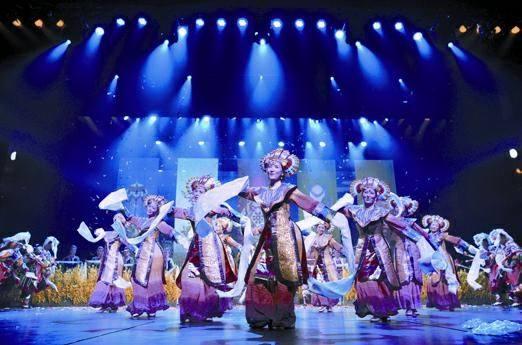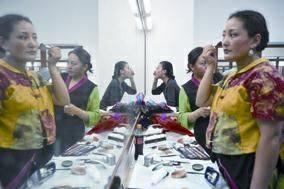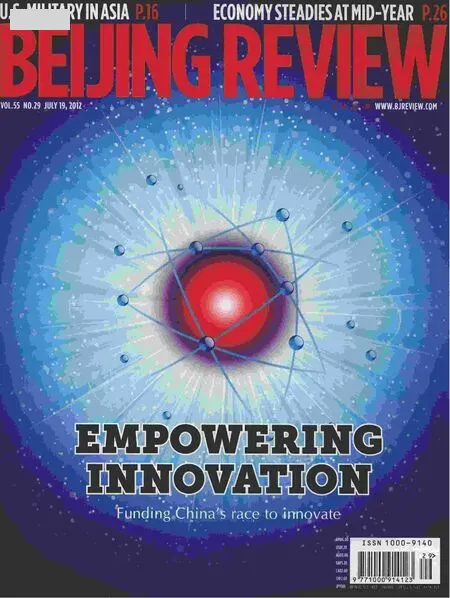Opera From Heaven
By Bai Shi


Surrounded by an air of mystery, three performers wearing blue masks entered the stage in the opening scene of a Tibetan opera. They recited a legend of a Tibetan figure from a distant age, in a familiar motif of the art form. With holy and customary fashion, the performers showed their respect for Thangtong Gyalpo (1385-1464), the founder of traditional Tibetan opera, who is regarded as the incarnation of wisdom and strength by Tibetan people.
On the evening of July 1, performers from the Tibetan Opera Troupe, based in Lhasa, capital of Tibet Autonomous Region, staged a debut of a new Tibetan play The Golden Home at the National Theater of China in Beijing.
The opera troupe traveled to the nations capital to attend the 4th National Ethnic Minorities Art Festival, held between June 7 and July 6. The art festival is attended by 41 troupes across the country, with each troupe presenting one play or opera representative of the uniqueness of a minority culture, according to Tondrub Wangben, Vice Minister of the State Ethnic Affairs Commission of China.
“Two features make the Tibetan play unique to the Beijing audience,” Ta Tsering Dondrup, head of the troupe, told Beijing Review, “First, the plot is based on a real story rather than a fiction; second, we use modern music and dance to enrich our performance rather than limiting it to traditional ways. We hope the Beijing audience could appreciate our ancient stage art and have more understanding of Tibetan culture,” he said.
Many in the festival audience were seeing Tibetan opera for the first time. After the premiere of The Golden Home, audience members expressed their views of the play. A Canadian living in Beijing named Andrew said he was very interested in Tibet and he was excited to watch the Tibetan opera in Beijing. Andrew said, “Their performance combines tradition and innovation.”
Reflecting realities
Unlike other traditional Tibetan opera, which are usually based on religion or myth, The Golden Home depicts a real-life story about common Tibetan farmers efforts to improve their lives, giving audiences a glimpse of the average Tibetans situation.
In the play, lead character Tondrub Tashi returns to his rural hometown after graduating from university. He plans to build a canal in a nearby mountain to help develop farming land for villagers. Despite his good will, the plan is denied by some villagers who believe the mountain is protected by a god who will punish them if they attempt to change the landscape.
“The story depicts the conflict between scientific thinking and outmoded superstitions, showing how modern Tibetan people free their minds from ignorance,” said Phurjung, the screenwriter of the play.
“The play is based on a true story,”Phurjung said. “I traveled to Luntse Prefecture in the southern area of Tibet in the summer of 2010, where I found that the local villagers led a comfortable life by planting newly bred crops thanks to the canal which they built to funnel water from mountains to irrigate farmlands.”
“When I returned to Lhasa, I decided to write a play based on what I saw during the visit,” he said. “It took more than a year for the play to premiere in Lhasa in 2011.”
Traditionally, Tibetans dare not reshape their lands, such as mountains, lakes and rivers, due to ancient beliefs that all of nature should remain intact, even as the villagerssuffered from infertile farmlands which lack irrigation, Phurjung explained.
However, “the younger Tibetan generations are no longer bound by old thoughts. They want to improve their lives by employing the knowledge and technology that they learn at schools and universities,” Phurjung said. “The change of minds is what I hope to show through the play.”
In the ending, Tashi successfully persuades his fellow villagers to build a canal to irrigate the lands and improve the life of the community.
Another theme focuses on the many Tibetan university graduates who return to their hometowns to improve local livelihood.
“In recent years, both the central and local governments have issued a series of favorable policies encouraging graduates to bring their knowledge and skills home for the benefit of local people,” Phurjung said.
For example, a graduate who returns home can take out zero-interest loans from banks to develop a project and can be exempt from tax for three years if he or she starts a business.
According to the Finance Bureau of Tibet, the Central Government and Tibetan local government have jointly invested more than 10 million yuan ($1.57million) to protect and promote Tibetan opera since 2005, laying a solid foundation for the future of Tibetan opera. Guided by the government, more Tibetan youth have chosen to set up businesses in their hometowns, improving the local economy and the lives of local villagers.
In addition, the government has allocated more resources in recent years to promote knowledge and technologies for local people. In Tibet, a total of 106.62 million yuan ($16.87 million) has been invested since the launch of the Rural Library Project in 2007 for the construction of 5,331 rural libraries, covering more than 92 percent of all Tibetan villages. Moreover, 80 percent of the books are written in the Tibetan language. These libraries have proven to be an effective way for farmers and herdsmen to acquire knowledge and learn about new technologies.
Operatic adaptations
As more innovative ideas are accepted by Tibetans, artists of traditional Tibetan opera also seek new ways to develop their traditional theatrical arts.
Tibetan opera has been performed by gen- erations for over 1,000 years on the plateau. Its history dates back further than any other style of Chinese opera, including Peking and Kunqu opera. Most Tibetan opera stories are based on Buddhist classics, historical narratives and ancient myths. Regarded as a living relic of Tibetan culture, Tibetan opera was listed as a Masterpiece of Oral and Intangible Heritage of Humanity by the UNESCO in 2009.
For the play The Golden Home, the troupe tried some storytelling methods that differ from traditional ones. “For example, we added many folk songs and arias to the play with Tibetan musical characteristics, which can be easily understood by young people,”said Pasang Tsering, director of the play.
The adaptation also required actors to make changes to their singing and dancing performances.
Palden Wangchug, 40, a star actor of the troupe, excels at playing famous historic characters in traditional opera.
“It is a challenge for me to perform in a contemporary story,” said Palden. “I spent months practicing new singing skills and narrative parts for the play.”
Palden said he visited universities to research his new role, observing young graduate students to learn how they think and communicate.
“The Golden Home has a strong element of realism, which is far from traditional Tibetan opera,” Palden added.
The impetus for innovation is driven by the young artists of the troupe. The troupe was established in Lhasa in 1960, with 132 staff currently in service. Over half of them are under 40 years old.
Sonam Dradul, 28, is the deputy director of The Golden Home. Sonam was first a performer of Tibetan opera, and later went on to study directing at the National Academy of Chinese Theater Arts.
“Real people and their stories are the foundations that inspire us to write new plays,” Sonam said. “In addition to writing real-life stories, we absorb elements of contemporary theater arts into our plays. As a result, young people can better understand our performances and might become more interested in traditional Tibetan opera.”
Nevertheless, innovation does not always breed success. “Newly produced plays are not as popular in remote rural areas as they are in cities,” Sonam said. “Older generations still prefer traditional opera and stories. They never seem to lose interest in those classic plays, no matter how many times theyve seen them.”
“Our attempts to innovate in Tibetan opera have a long way to go,” said Ta Tsering.“But we will adhere to both inheriting traditions and developing new plays, as if they are the two legs of a man.” He stressed, “It is a common task for all Tibetan opera artists to pass on this ancient theater art.”

